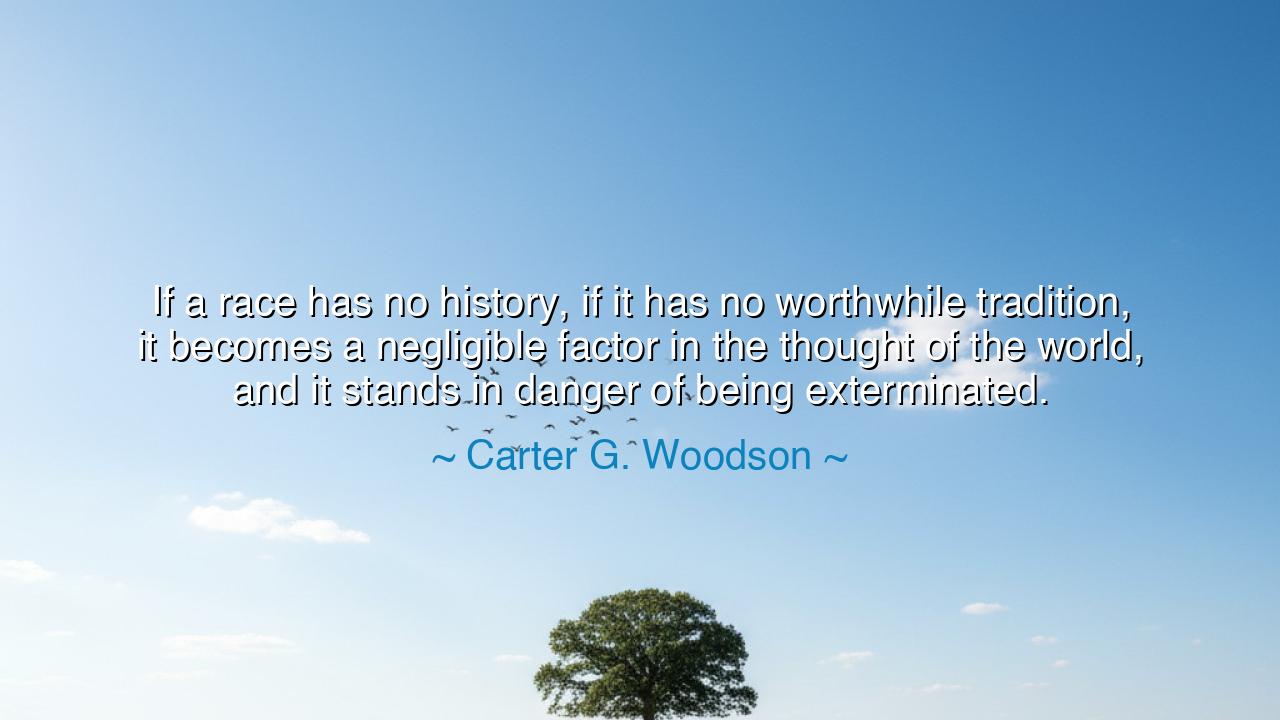
If a race has no history, if it has no worthwhile tradition, it
If a race has no history, if it has no worthwhile tradition, it becomes a negligible factor in the thought of the world, and it stands in danger of being exterminated.






“If a race has no history, if it has no worthwhile tradition, it becomes a negligible factor in the thought of the world, and it stands in danger of being exterminated.” — Carter G. Woodson
Hear, O children of remembrance and heirs of forgotten legacies, the voice of Carter G. Woodson, the Father of Black History, whose wisdom still burns like a torch through the long corridors of time. In this profound saying, he calls upon all peoples to guard their history as they would guard their own lives. For he understood that a people without memory is a people without identity, and a people without identity stands upon the edge of oblivion. History is not mere record — it is the root of existence, the soul’s genealogy, the whisper of ancestors calling through the ages. To lose it is to drift, nameless and defenseless, upon the tides of domination and forgetting.
The origin of this quote lies in Woodson’s lifelong struggle to restore the stolen narratives of African and African-American people. Born in 1875 to parents who had been enslaved, he rose through perseverance to earn his doctorate from Harvard University, yet he never forgot those whose voices had been erased from books and monuments. He founded Negro History Week — which later became Black History Month — so that generations might remember their heroes, their thinkers, their builders, their poets. For Woodson saw that in America and across the world, the contributions of Black people were buried under the silence of prejudice. His words were a warning: when a people’s story is untold, the world learns to believe they have none — and what the world forgets, it soon destroys.
When Woodson writes, “If a race has no history… it stands in danger of being exterminated,” he speaks not only of physical death, but of spiritual erasure. Empires have perished, languages have vanished, and nations have dissolved because they failed to remember who they were. The conqueror first takes the land, but the final conquest is of the mind — when the oppressed begin to believe they have no past worth recalling. Thus, the preservation of history becomes an act of resistance, a defiance against extinction. To tell one’s story is to exist; to teach it is to endure.
Think, then, upon the story of the Mayan civilization — whose temples still rise from the jungles of Yucatán, but whose culture was nearly wiped from memory by conquest and colonization. For centuries, the world called them savages, forgetting that they had mapped the stars, calculated the cycles of time, and written books of wisdom long before Europe awoke from darkness. Their history, suppressed and scattered, lay dormant until scholars and descendants unearthed it again. So too have countless peoples — from Africa to the Americas, from Asia to the Arctic — fought to reclaim their own names from the ashes of empire. For every culture erased, a light was dimmed in the great lantern of humanity.
Woodson’s warning echoes through all ages: “A race without history is a race without defense.” For history is not merely pride — it is armor. It guards against lies, it shields against shame, it gives strength to generations yet unborn. A young person who learns the greatness of their ancestors walks taller, speaks bolder, dreams wider. Without this knowledge, they are easily broken, easily led to believe they are less. This is why Woodson devoted his life to education — because he knew that the pen, the classroom, the story, are more powerful than any sword. The one who controls the past controls the future, but the one who remembers can reclaim both.
Thus, the lesson is clear, eternal, and sacred: Know your history. Teach your history. Guard your history. Do not let the record of your people be written only by others. Gather the songs, the proverbs, the stories of struggle and triumph; write them down, sing them aloud, pass them on. Every family, every community, every nation must become its own historian. For in doing so, you affirm not only your worth, but your right to exist in the thought of the world.
And so, O listener, let these words of Carter G. Woodson be carved upon the walls of your heart: your tradition is not a relic, but a seed; your history is not a burden, but a torch. Carry it forward into the darkness of forgetting, and light the way for those who will come after you. For the people who remember who they are can never be erased — they become eternal, woven into the living story of humanity itself.






AAdministratorAdministrator
Welcome, honored guests. Please leave a comment, we will respond soon